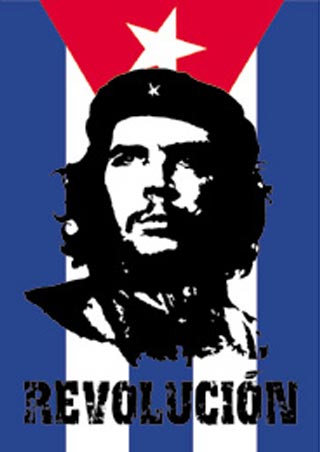FRFI 169 October / November 2002

‘Let the flag under which we fight be the sacred cause of the liberation of humanity’
35 years ago this October, Ernesto Che Guevara was arrested, tortured and murdered by CIA-trained Bolivian soldiers. After playing a leading role in the Cuban Revolution, both in the war of liberation and in building socialism after 1959, he had travelled as a revolutionary first to Africa and then Bolivia, with the aim of carrying out in practice his call to build ‘two, three and many Vietnams’.
Che Guevara was a revolutionary fighter, an internationalist and, first and last, a communist. His political and economic writings remain vital weapons in the hands of all socialists and continue to inspire those fighting against imperialism around the world today. His example, far from being that of some long-forgotten student icon of the 1960s, remains as vibrant today as the triumph of Cuba’s socialist revolution that it embodies, and lives on in the pledge of successive generations of Cuban school children each morning: ‘We will be like Che!’ As imperialism prepares itself once again for war against the poor of the world, we do well to remember Che’s call: ‘Let every action be a battle cry against imperialism and a call for the unity of the peoples against the great enemy of the human race, the United States of North America.’
Che’s economic and political legacy
As well as being a revolutionary soldier, Che was a socialist thinker and writer. Steeped in the writings of Marx, Engels and Lenin, he applied their theories to the building of socialism in Cuba. Against those who argued for a role for the market in building socialism, he saw the essential role of the planned economy:
‘Centralised planning is the way of life in socialist society. It is what defines it and is the point at which man’s consciousness succeeds in finally synthesising and directing the economy towards its goal, which is the complete liberation of the human being within the framework of communist society.’
Alongside building a new economy, socialism must construct a new human being. Capitalism, through its enshrinement of greed, of the relentless search for profits, of the exploitation of man by man, produces a definite individualistic, selfish and greedy consciousness. Socialism requires a different kind of consciousness – one based on co-operation and a sense of collective responsibility. Such a consciousness can only be created as part of the process of building socialism, through education, voluntary labour, moral rather than material incentives and example. As both President of the National Bank and Minister for Industry in Cuba in the early 1960s, Che oversaw agrarian and industrial reform, stressing throughout the central role of the Cuban working class.
In the decades after Che’s death, as the Cuban Revolution became increasingly threatened by a return to capitalist market mechanisms and a consequent lowering of revolutionary consciousness amongst the masses, it was to Che Guevara’s writings that Castro turned, in what became known as the Rectification Period.
‘We’re rectifying all those things, and there are many – that strayed from the revolutionary spirit, from revolutionary work, revolutionary virtue, revolutionary effort, revolutionary responsibility; all those things that strayed from the spirit of solidarity amongst people. We’re rectifying all the shoddiness and mediocrity that is precisely the negation of Che’s ideas, his revolutionary thought, his style, his spirit and his example.’ (Fidel Castro, 1987)
An internationalist fighter
A revolutionary internationalist, Che called for a struggle without borders, where every battle for liberation was part of a single, united struggle against imperialism and where sympathy from the sidelines was simply not enough – one must literally ‘join that victim [of the struggle] in death or victory’. Living by his convictions, in 1966 Che led a guerrilla detachment against the military dictatorship of Bolivia. Betrayed, wounded and captured on 8 October 1967, within 24 hours he was dead.
In 1965, at the Conference of Asian-African Solidarity in Algiers, Che had said: ‘Wherever death may surprise us, let it be welcomed if our battle cry has reached even one receptive ear, if another hand reaches out to take up our arms, and others come forward to join our funeral dirge with rattling of machine guns and with new cries of battle and victory.’ Today, wherever the working class and oppressed peoples of the world are in struggle against imperialism, Che lives on. From the occupied territories and refugee camps of Palestine and the streets of Turkey to the mountains of Colombia, his words still resonate.
On 9 October, Rock around the Blockade will be holding a torchlit demonstration to commemorate the life and political thinking of Ernesto Che Guevara and his enduring legacy to the struggle of humanity for liberation.
Cat Alison
Che Guevara commemoration, Wednesday 9 October, 6.30-9pm, steps of St Martin-in-the-Fields, Trafalgar Square, London WC1 see report on Rock Around the Blockade website: www. ratb.org.uk .




